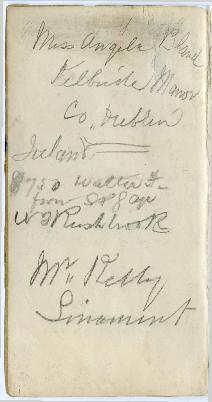File contains obituaries for Collison as well as for his son Henry Alexander (H.A.) and granddaughter Katherine Clarke (nee Collison); various articles re: Collison’s many accomplishments; a letter of condolence from Councillors of the Haida Nation on the occasion of his death, a program from Collison’s memorial service at Metlakatla, and a typed biography.
Small booklet containing handwritten notes of what appears to be a speech prepared by W.H. Collison on the topic of traditions and events he had been witness to along the northwest coast of British Columbia.
File consists of a speech given by Gary Runka entitled "Who Gets to Use the Land and Water? - the Urban and Agricultural Land Needs of the Okanagan Valley" for the Faculty of Agricultural Sciences, UBC and Okanagan College.
Commentary on this speech by Barry Smith of the Ministry of Agriculture and Lands:
"Although the ALR and ALC Act are not mentioned directly, the paper is focused on agriculture and rural planning.
When speaking of the competition for land and the pressure agricultural land is under, an interesting statement is included referring to the fact that "the fluctuation" in Washington State's apple crop is greater than the entire annual Okanagan production.
The paper reviews pressures on agriculture and urban land uses. Under "Satisfying the Needs (Options and Interrelationships)" seven points are made including "Understanding the land is the most important prerequisite to its wise and proper use," and that Integrated Natural Resource Management and Land Use Planning must be closely tied.
The paper ends with a point of optimism - "I see that potential to increase our understanding of the natural processes and to explore the questions of who gets to use the land and water from a view point somewhere in the orchard or countryside rather than from Main Street. That's a beginning."
File consists of a speech given by Gary Runka entitled "Winter Range for Ungulates" for the Symposium on Threatened Species and Habitats in British Columbia and the Yukon.
File contains maps, working plans, and related correspondence.
File consists of a speech given by Gary Runka entitled "Working Together Towards Identifying and Protecting Land for Nature in the Kamloops Area" to an unknown audience.
This data set consists of elemental analysis data for selected B horizons from Wounded Moose paleosols sampled by Tarnocai and Smith. The file includes the original ALS lab report, additional panes showing comparison of replicates, and calculation of a weathering index.
